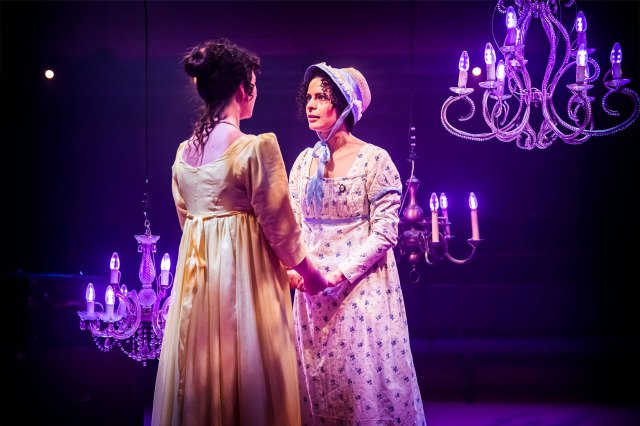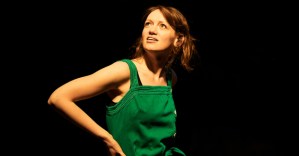Northanger Abbey at Orange Tree Theatre – review
Zoe Cooper’s adaptation of the Jane Austen novel runs until 24 February

Playwright Zoe Cooper has written a very modern, knowing take on Jane Austen. Her version of Northanger Abbey is clearly powered by love for the original tale, which brings its heroine’s Gothic fantasies into collision with the real-world realities of money and class.
But the complications this Catherine Morland encounters here also include the depth of her feelings for her friend Isabella, and her desire to be a novelist. It’s as interesting and clever as you would expect from Cooper whose previous play Out of Water was shortlisted for multiple prizes, but slightly convoluted, as if a light carriage has suddenly been asked to carry too heavy a load.
It is, however, beautifully staged by director Tessa Walker who keeps a tight rein on a versatile and engaging cast of three. Rebecca Banatvala mainly plays Cath, our heroine, chin high and imagination wild, who packs a strong right fist as well as a spirited determination to escape her “unremarkable, plain” Northern vicarage life with her “humble, ordinary and unremarkable family.”
Between them, AK Golding and Sam Newton play all the remaining parts with great panache. Newton has fun with Catherine’s two contrasting suitors, the gentle Henry Tilney who understands the qualities of muslin and who reveals himself as Cath remarks “as bordering on the perceptive”, and the brash John Thorpe, all swallowed vowels, huge gestures and ignorant assumptions. He also plays Cath’s mother, who thinks nothing of staggering out to prune the cherry tree before she gives birth. Golding is sharp and touching as Isabella and both funny and threatening as the many swaggering men who disturb their idylls.
Walker and her movement director Jonnie Riordan stage all the encounters with some subtlety and pace. Designer Hannah Sibai has painted the Orange Tree’s panelling pink and shifts the scene with a pile of trunks, a chaise longue, and a table; chandeliers rise and fall as the action moves from place to place. There’s a pacy scene in a racing carriage and a brilliant ball where Catherine notes the problems of Georgian country dancing. “I am not dancing with anyone. I am dancing near many people.”
In the end, though, the momentum begins to flag as Cooper tries to do perhaps too many things – retaining the basic outline of the Northanger Abbey plot while embellishing it with a different momentum as the play makes its way to an ending that is neither conventionally happy nor conventionally sad but involves Cath – who has throughout seen herself as a commentator on her own life – finding true agency as a writer, who controls the world through her words.















